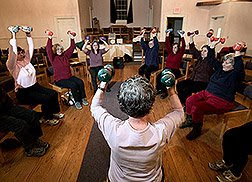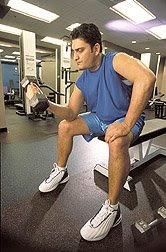Exercise Tips and Health Benefits of Exercise
Exercise Tips and Health Benefits, Diet and Exercise and Natural Nutritional Enhancers. Coenzyme Q10: Exercise Duration Is Increased
Coenzyme Q10: Exercise Duration Is Increased
Coenzyme Q10 appears to increase the duration of exercise to exhaustion in healthy untrained and trained individuals. Coenzyme Q10 is a vitamin like, fat-soluble substance existing in all cells. Coenzyme Q10 acts as an essential antioxidant and supports the regeneration of other antioxidants...Read full article
Exercise, Fitness & Dietary Nutrition – Zinc
Healthy Exercise, Fitness & Dietary Nutrition: Consuming lower than recommended levels of dietary zinc could be especially hard on the body during exercise, according to an Agricultural Research Service (ARS) study. Ever wonder how some people exercise routinely with a bounce in their step, while others get to the gym and soon end up staggering to the first chair they see?...Read full article
Exercise Tips and Myths
K-State expert on physical fitness responds to exercising myths. How much do you really know about exercise? David Dzewaltowski, associate professor of kinesiology at Kansas State University, gives tips on what is true and false about exercise. * "I can lose weight in a certain spot on my body by exercising that spot." FALSE - You cannot lose body fat by exercising a particular region of the body. The best way to lose body fat...Read full article
Stretching Before or After Exercise? Misconceptions Explained
"A well-rounded fitness program includes stretching," said Craig Harms, assistant professor of kinesiology. "A lot of the misconception with stretching is when to stretch, because you really shouldn't stretch before exercise when muscles are cold, but you should stretch a warm muscle. "It's best to stretch a warm muscle because when problems happen with injuries and low back pain, it generally happens when people stretch when their muscles are cold or they aren't warmed up," he said...Read full article
Strong Abdominal Muscles Don’t Require Exercise Machines
If all you want for Christmas is a great set of abs, then a recent study of ab machine effectiveness is just for you. Exercise scientists at Kansas State University found that the unassisted crunch or sit-up is as good a workout for the abdominal muscles as any you'd get using typical abdominal exercise equipment on the market now...Read full article
Creatine Side Effects: Myths and Safety Profile - Part 1 of 5
No serious side effects from creatine have ever been recorded in research. A common misconception is that creatine is an abusive steroid-like substance that can kill you. With a little education, most people can realize the falsity of their claims. Media reports have often claimed that creatine usage is a dangerous and unnecessary practice; often linking creatine use to anabolic steroid abuse. This is the International Society of Sports Nutrition Position Statement on the use of creatine and exercise:...Read full article
Facts and Benefits of Creatine - Part 2 of 5
Creatine has become one of the most extensively studied and scientifically validated nutritional ergogenic aids for athletes. Additionally, creatine has been evaluated as a potential therapeutic agent in a variety of medical conditions such as Alzheimer's and Parkinson's diseases...Read full article
The Best Creatine? Creatine Monohydrate Effectiveness - Part 3 of 5
Many forms of creatine exist in the marketplace, and these choices can be very confusing for the consumer. Most of these forms of creatine have been reported to be no better than traditional creatine monohydrate in terms of increasing strength or performance...Read full article
Medical Safety of Creatine Supplementation - Part 4 of 5
While the only clinically significant side effect reported in the research literature is that of weight gain, many anecdotal claims of side effects including dehydration, cramping, kidney and liver damage, musculoskeletal injury, gastrointestinal distress, and anterior (leg) compartment syndrome still exist in the media and popular literature. While athletes who are taking creatine monohydrate may experience these symptoms, the scientific literature suggests that these athletes have no greater, and a possibly lower, risk of these symptoms than those not supplementing with creatine monohydrate...Read full article Should Creatine Supplements be Banned? - Part 5 of 5
Should Creatine Supplements be Banned? - Part 5 of 5
Opponents of creatine supplementation have claimed that it is not safe for children and adolescents. While fewer investigations have been conducted in using younger participants, no study has shown creatine monohydrate to have adverse effects in children. In fact, long-term creatine monohydrate supplementation (e.g., 4 – 8 grams/day for up to 3 years) has been used as an adjunctive therapy for a number of creatine synthesis deficiencies and neuromuscular disorders in children. Clinical trials are also being conducted in children with Duschenne muscular dystrophy...Read full article
Physical Activity or Exercise? - Making a New Year's Resolution
Being fit in the New Year does not have to mean going to the gym. When starting a new fitness program this year, David Dzewaltowski recommends focusing on the term "physical activity" as opposed to "exercise."...Read full article
Is Starting a New Exercise Program Your New Years Resolution?
Struggling with your New Year's resolution to attend aerobics class five times a week, or run two miles a day? A Kansas State University professor says if you haven't been active, and you are beginning a new exercise program, take it slow and start out by adding activities you enjoy...Read full article






